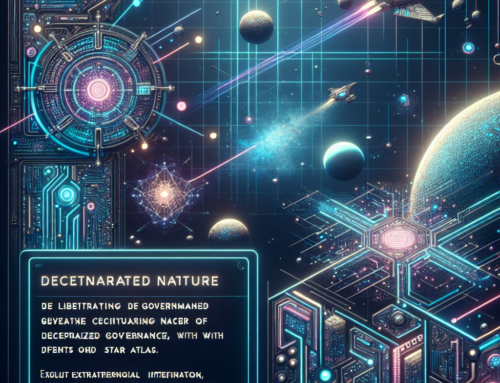Interstellar Irony: Political Satire in Star Atlas

Interstellar Irony: Political Satire in Star Atlas
At Titan Analytics, where we specialize in Solana validation and Star Atlas analytics, we often find ourselves reflecting on the deeper themes present within the universe of Star Atlas. One fascinating aspect is how the game serves as a ripe ground for political satire, utilizing the concept of interstellar irony to mirror our own society’s complexities.
The Context: What is Star Atlas?
Star Atlas is not just a game; it’s an expansive metaverse that combines elements of exploration, strategy, and economic simulation. Players engage in deep space exploration, resource management, and inter-galactic diplomacy. This immersive world is also a canvas for exploring serious themes, with political undercurrents that resonate with our own world.
Interstellar Irony: The Bridge to Political Satire
Interstellar irony in Star Atlas relates to situations where the outcomes in the game reveal a stark contrast to player intentions or the context of the in-game narratives. For instance, factions like the ONI and the Ustur can sometimes embody characteristics reminiscent of today’s political structures.
Imagine a scenario where a player, aiming to build a peaceful trading coalition, inadvertently sparks a massive conflict. This illustrates a deeper social commentary: cooperation can lead to unforeseen consequences, reflecting how diplomatic efforts can sometimes spiral out of control in the real world. The irony lies in the disconnect between a player’s altruistic goals and the chaotic outcomes they create, a theme that can be found throughout history.
Characters and Factions: Parodic Archetypes
Many factions and characters in Star Atlas resonate with archetypal figures we see in contemporary politics. The Ustur, characterized by their keen sense of commerce, might remind us of corporate entities wielding disproportionate power in our own economies. Conversely, the ONI, shrouded in secrecy and manipulation, reflects the often opaque nature of political machinations present in governmental systems worldwide.
By portraying these factions in exaggerated and often absurd manners, Star Atlas creates a humorous yet pointed analysis of political dynamics. Players may find themselves chuckling at the behaviors of these factions while also recognizing the reflections of their own experiences with political systems.
Market Dynamics: A Satirical Lens on Economics
The game’s economy is another crucial avenue for political satire. Players engage in resource trading and management, often facing market whims akin to real-world economic fluctuations. The irony manifests when players invest time and resources in speculative trades, only to discover that market valuations can tumble overnight.
This aspect of the game serves as a clever commentary on market volatility and the unpredictability of financial systems, mirroring real-world investors’ experiences. As players navigate these ups and downs, the game implicitly critiques both the blind optimism and cynical despair that often accompany market speculation.
Concluding Thoughts
Star Atlas isn’t merely entertainment; it incites players to reflect on political and economic dynamics through its interstellar irony. By holding up a mirror to the complexities of our own world, it offers both humor and insight into human behavior and governance.
At Titan Analytics, we’re dedicated to diving deeper into the nuances of Star Atlas to provide our community with valuable insights. For those keen to explore this fascinating universe further, we invite you to check out our Star Atlas data modules at Titan Analytics Data Modules or reach out to us directly via Titan Analytics Contact Page.
Join us as we navigate the cosmos of both strategy and satire!




